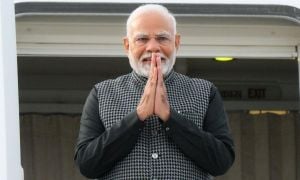Lord John Prescott, the former deputy prime minister of the United Kingdom, passed away this week at the age of 86, leaving behind a legacy marked by dedication to social justice, unyielding loyalty, and vibrant character. His family announced his death, noting he died peacefully at a care home, surrounded by loved ones and the soothing jazz music of Marian Montgomery.
Born on May 31, 1938, in Prestatyn, Wales, Prescott's life was truly emblematic of the working-class spirit he championed throughout his storied political career. He left school at 15 to work as a steward on cruise ships and later became involved with trade unions. His passion for public service drove him to enter politics, representing his constituency, Hull East, for nearly four decades, and achieving the role of deputy PM from 1997 to 2007 during Tony Blair's administration.
Described by many as the 'heart and soul' of the Labour Party, Prescott played a pivotal role during Labour's resurgence under Blair, known for his bluntness and no-nonsense attitude. His first major legislative achievement was the negotiation of the Kyoto Protocol, showcasing his commitment to environmental issues.
Throughout his political tenure, Prescott's personality shone through. His candid demeanor earned him the nickname "Two Jags" due to his preference for using two Jaguar cars, which once garnered criticism during his efforts to promote public transport. Despite the moniker's negative connotations, Prescott embraced it with humor, as he once quipped he now identified as "Zero Jags".
Prescott's unfiltered nature was also evident during the 2001 general election, where he made headlines for punching an egg-throwing protester. The incident captivated the media, earning him additional attention outside his political duties. Blair humorously defended him, remarking, "That’s just Prescott being Prescott. There are no rules he truly abided by."
Across party lines, Prescott was respected by many, including former Prime Ministers Gordon Brown and David Cameron, who acknowledged his contributions to British politics. Brown, who succeeded Blair, called him a "working-class hero" and praised his ability to bring unity within the Labour Party during challenging times. He also underscored Prescott's significant achievements concerning devolution, housing improvements, and climate advocacy.
The King, reflecting on Prescott's extensive public service record, released heartfelt remarks, describing him as having a “unique and indomitable character,” and lamenting the loss of such a vibrant figure from public life. Sir Keir Starmer, the current Labour leader, paid tribute as well, calling Prescott “a true giant of the Labour movement,” emphasizing his unyielding commitment to the working class and unity within the party.
Despite his alignment with the Labour agenda, Prescott also voiced his disagreements, particularly concerning the Iraq War, which he later deemed unjustifiable. This demonstrated his integrity and commitment to his principles, even when it conflicted with the wider party direction.
His family released a poignant statement, expressing their sorrow over his passing and acknowledging his lifelong dedication to public service. Prescott was recognized not only as someone who sought to improve the lives of others but also as someone who embodied the spirit of resilience and authenticity. "John spent his life trying to improve the lives of others, fighting for social justice and protecting the environment, from his time as a waiter on cruise liners to becoming Britain’s longest-serving deputy prime minister," the family said.
Prescott's legacy as the quintessential working-class politician will be remembered fondly, both by those who shared his views and by those who opposed them. His death serves as a stark reminder of the transformative impact he had on British political discourse.
Prescott’s passing marks the end of an era for many who identified with the traditional Labour identity he represented. A true trailblazer within the party, he will be missed not just as a politician but as a character who enriched the political arena with his unwavering spirit and genuine connection to the people he served.



